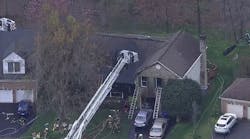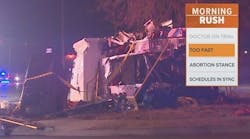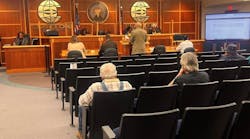When I retired from the Newark, NJ, Fire Department in 1999, I envisioned a life filled with sitting in my comfortable living room recliner. I saw countless hours of the History Channel stretching out in front of me. My mind was at peace as I pondered the chance to review the 200-plus war movies that I had stocked up on the shelves of my office. I looked forward to memorizing the movie version of World War II. Somewhere along the road to this pleasing picture, I lost my way. It is so easy to fall into the trap of saying "yes" with your lips, even though your mind is screaming "no."
Building my consulting practices was another important aspect of my retirement from the active fire service. Being a somewhat practical person, I knew that as a man with three children in college I could not really retire to the comfort of cocoon-like womb of my living room. I knew that there had to be a balance between work and play.
Over the past few months, I have come to face the fact that I have failed in my mission of mixing work and retirement. Sad to say, I have managed to fill my calendar with too much work and too many events. These things are taking me away from my central focus: TV and tubas.
By way of background on myself, I have always been one to grab for life's brass ring. I have always felt that I could do anything in the fire service world, and do it well. In addition, I have always tried to be a helpful person. As a consequence, I now find myself hopping and skipping to stay in step with the stepped-up beat of my new life.
How many of you now find yourself trudging along in a similar circumstance? Identifying the problem is simple, my friends. We have trouble saying no. That problem is compounded by the fact that most of us are lousy time managers. On the other hand, the solution is not simple at all. It involves changes in our approach to life, to time and to people who make demands on our time.
As I have tried to work my way through the time-management morass within which I have managed to enmesh myself, I discovered that I am the problem. I also managed to come to grips with the fact that the same problems I am speaking of in this commentary are the same ones that occasionally got me into some real close calls in the world of being a chief fire officer. Most of these situations came about as a result of me being too much of a nice guy, as well as overestimating my skills.
I hope that I shocked you with that last statement. After writing about leadership in this column for three years now, it would be my hope that you know a bit about me by now. I really loved to take care of the troops that I had been blessed to lead. I always went out of my way to insure that my gang was treated fairly. But how much of that came as a result of some other important aspect of my life? Was I trying to be a good leader, or was I just trying to get people to like me? That's a tough call.
This is a different direction for me to pursue; however, I believe there is good reason to stay with me in this pursuit of a new idea. Each of us has only so many minutes on the face of God's Green Earth. What we do with those minutes determines who we are as people and how we will live our lives. One great example of this comes from the fact that moments spent away from our families can never be recaptured.
I think one of the keys to becoming a better leader comes from an increased awareness of the fact that we must come to understand ourselves. It is my belief that the better we come to know ourselves the better will be our journey through this life. Coming to grips with who we are and what we believe in will strengthen us a people and, I believe, make us better leaders.
Far too many people spend their lives living their work position as the be all and end all of their existence. You have seen them and I have seen them. Heck, you and I might be them. These folks labor endlessly in the vineyards of their employer. They spend countless hours away from home, they miss important moments in the lives of their wives and children, and they seek accolades for their work over hugs from their loved ones.
How many times do people like this end up being vilified for their efforts and cast out at the end of their careers like so much human refuse? At this point, I feel that I must ask a question that is so frequently heard and read around the world. How many people who are lying on their deathbed rise up and yell out loudly, "I wish I had spent more time at work"?
This leads me to the main part of my argument. Since there are only so many minutes in a day, why are we not using them more wisely? I am of the opinion that far too many people in the world are just like me. We are died-in-the-wool procrastinators. Our motto is, was, and always will be, "Why do today what we can put off until tomorrow?"
I believe that I am coming to grips with a reason for this. It goes back to my thesis above that states that there are only so many minutes in a given life. This leads each of us to develop certain fears:
- I am afraid that I will never do everything that I want to, but I have to try hard to do as many things as I possibly can.
- I am afraid to try and fail. I would hate to waste time on failure.
- I am afraid that if I do not fill my life with a wide array of activities, that when I do get old and retire I will have nothing to fill my days. These fears can drive you to distraction and ruin your life. These fears are real, although we may never publicly acknowledge them. To do so might be perceived as a sign of weakness, and fire people are notoriously reluctant to show any sign of weakness.
I suggest that there is a better reality that those who aspire to become effective leaders must come to understand. Each who seeks to lead others must acknowledge that there is only so much that any one human being can do. Each of us can only do what we can do. We must then delegate the rest of the tasks. However, even then there is a limit to what any leader and their team can accomplish.
It is a simple mathematical problem. X number of people can only perform X number of units of work. If more is required, then more must be supplied. As leaders within the fire service, we have to stop giving the impression that we can continue performing ever-increasing amounts of work with the same number of people. I guess that it is fashionable to keep bragging about doing more with less. However, it is a bogus operational mode.
I am suggesting to you that a new time has arrived. We need to change. When faced with the requirement to do more than you have the resources to do, you must adopt the slogan that was used for years by our friends in the law enforcement community: Just say no.
That's fine for you to say, Harry. You do not work where I work, you do not know my boss. He (or she) will:
- A. Fire me
- B. Transfer me
- C. Discipline me
- D. Demote me
Yes, these are all possibilities. There is an even further possibility that the ill will engendered by your refusal to attempt the impossible will stunt your career and limit your growth. Sorry, gang, but that's the way I see it.
In looking back at my career in Newark, I find that I have but one regret. I have come to the conclusion that I should have stood up to the boss a bit more. I should have gone public with my dissatisfactions. I should have said no more often. I guess that my military background prevented me from doing what I am suggesting that you do. I accomplished a number of things, but there was more that could have been done.
Ladies and gentlemen, I am coming to grips with the fact that I am not Superman. I cannot save the world from anything. My wife once accused me of continually believing that I was always trying to do too much for too many people. She may even have accused me of trying to save the world, although I am not sure now how I could have thought that. I am now coming to grips with the fact that I am just one more aging, gray-haired guy with a lot of ideas. I am a man with regrets. I am a man with many happy moments. However, I am also a man possessed with great faith and hope. I believe that it is never too late to learn from our own mistakes. The joy of discovering who I really am frees me from all sorts of silly expectations. I urge you to take a close look at who you are and what you can really do.
It is my suggestion to you that if you are to have any hope of leading others, you must first get a handle on who you are. I first read this statement nearly 30 years ago. However, like many things in life, it has taken the living of life to convince me of the rightness of this statement.
You must be grounded in the reality of what you can and cannot do. You must explore the perimeters of your psyche. You must be able to set reasonable expectations for your own performance. All of these tasks must be successfully completed before you can ever hope to set goals for those you are privileged to lead. I say all of this knowing just how hard a task it really is.
Let me close by saying that what I am suggesting to you in this column is not easy. You must first celebrate your strengths and then you must search out your weaknesses. Build upon your strengths and then work to overcome your weaknesses. It sure sounds real easy to do, doesn't it? Let me know what you think after you try it. However, please try it. It will pay great dividends.
Harry R. Carter, Ph.D., MIFireE, is a Firehouse® contributing editor. A municipal fire protection consultant based in Adelphia, NJ, he is a former president of the International Society of Fire Service Instructors (ISFSI). Dr. Carter is an associate professor at Mercer County Community College and a past chief and active life member of the Adelphia Fire Company. A fire commissioner for Howell Township District 2, he retired from the Newark, NJ, Fire Department in 1999 as a battalion commander. He also served as chief of training and commander of the Hazardous Materials Response Team. Dr. Carter is a Member of the Institution of Fire Engineers of Great Britain (MIFireE). You can contact him through his website at [email protected].




